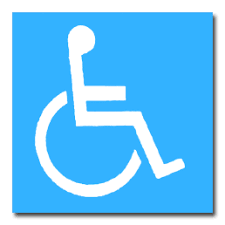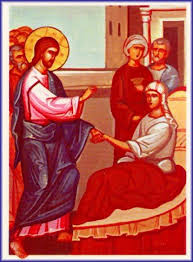
Epiphany 5-B
February 8, 2008
Isaiah 40:21-31
Psalm 147
1 Corinthians 9:16-23
Mark 1:29-39
When I was in seminary, I had a professor who had no arms. He had been born with a birth defect, and over the course of his life had learned to do with his feet many of the things that the rest of us do with our hands. After a while you didn’t notice much different about him, even when he’d sit at the lunch table and pick up his fork with his toes.
I went to seminary in New York City. There was a woman who used to stand on the sidewalk in front of Bloomingdale’s, a rather fancy department story, and shout, “Help me. I’ve got cerebral palsy. Help me. I’ve got cerebral palsy,” over and over again. I think she was asking for money, but since I never stopped to ask her what kind of help she wanted, I don’t really know.
Also, when I was in seminary, I went to a service commemorating “disability awareness week” or something like that. It was at the Chapel of the Church Center for All Nations – an expansive place, which welcomes all kinds of worshippers. The celebrant was an Episcopal priest who served the deaf community. One young man stands out in my memory – he was the preacher, I think, a disability rights advocate. He was an amputee, I think. I know he refused to wear prosthesis – artificial limbs – because he had no interest in making those of us who were “fully abled” feel more comfortable with his disability. He also refused to use those metal crutches with arm holders that many people use – again on the grounds that they served to make “able-bodied” people feel more comfortable because they could categorize him as “disabled.” He preferred using wooden crutches, like anyone would use.
All these stories, along with today’s Gospel story of the healing of Simon’s mother-in-law, raise these questions: what is sickness? What is health? What does it mean to be healed?
Last week, we read of how Jesus cast the demons out of a man possessed by what we today might call mental illness. In the words of the old hymn, Jesus “reclothed him in his rightful mind.” He restored him to wholeness. He cast out those outside forces which had invaded the man, and gave him back himself. No longer was he possessed by those alien forces; he could return to the rest of society, to his community and his family, as himself, restored, healed.
Whatever fever Simon’s mother-in-law has, it must be serious. The normal remedies must not be working. They way she is isolated and alone, even in the house, makes us think that perhaps they had given her up for dead. When Jesus touches her, healing happens, but not healing like we would think of a doctor making a house call. Jesus doesn’t administer an antibiotic, or apply leeches, or mix a poultice, or shake a magic rattle. Jesus touches her, and yes, she is relieved of the fever, but look what happens then: she is restored to her family. She joins the party. She gets up and helps serve. She regains her place of honor and dignity. She is no longer a patient; she is a person. She is restored, healed.
In those three stories of my seminary days, I think I learned that “healing” is not just about an individual who “gets better.” I don’t think there is a “cure” for cerebral palsy, nor can someone without limbs grow them back. Healing, for those people, challenges our definitions – OUR definitions – of wholeness. Wholeness is not perfection. Wholeness is not some idealized state of no flaws. Wholeness is about being human, fully human, being a full member of the human race. The sick person is isolated; the healed person, no matter what his or her state of disability may be, is restored from that isolation to wholeness, to community, to family and friends. The healed person is a productive and needed and loved member of society. This is what Jesus means by healing: those who were outcast, who were suffering and alone, are brought back inside the fold. Healing is not just “fixing an illness;” it is restoring a person to being, once again, a whole human being who has meaning and value and a place in the community.
Many of us wonder, and I know I have felt this way, when we are sick or in trouble, why me, why I am sick? What have I done to deserve this? Why can’t Jesus help me? Where is the healing in my life?
It is hard to climb out of those pits; no doubt about it, and there certainly are some things about our lives – all of our lives – that we don’t like, and like it or not, that will never change. We can stay there, carrying all those grudges, nursing all those hurts. We can perpetuate our isolation, thinking we are all alone in our troubles, and no, Jesus isn’t going to walk through that door and make everything better – or at least “better” in the way we think “better” ought to be defined.
But listen to this: we have what Jesus had. We have the promise from God that things will be better, that they are better. “Have you not known,” Isaiah writes. “Has it not been told you from the beginning?” We have the same promise from God that Jesus knew, that God gives power to the faint, and strength to the powerless – that God calls all – all of us – by name, and not one is missing: not the woman with cerebral palsy, shouting outside of Bloomingdale’s, not my professor who ate with his feet, not the disability activist who refused to hide his amputated limbs. Simon’s mother-in-law is there, and the man possessed by demons, and you, and, you and you, and you, and me. Everybody who is home sick today; everybody who is just too tired to get out of bed. We’re all there, called by God, called by hope, pulled out of our isolation and aloneness. This is what God promises us: with wings like eagles, we shall run and not be weary; we shall walk, every one of us, we shall walk and never grow faint.



.jpg)
.jpg)







.jpg)

No comments:
Post a Comment